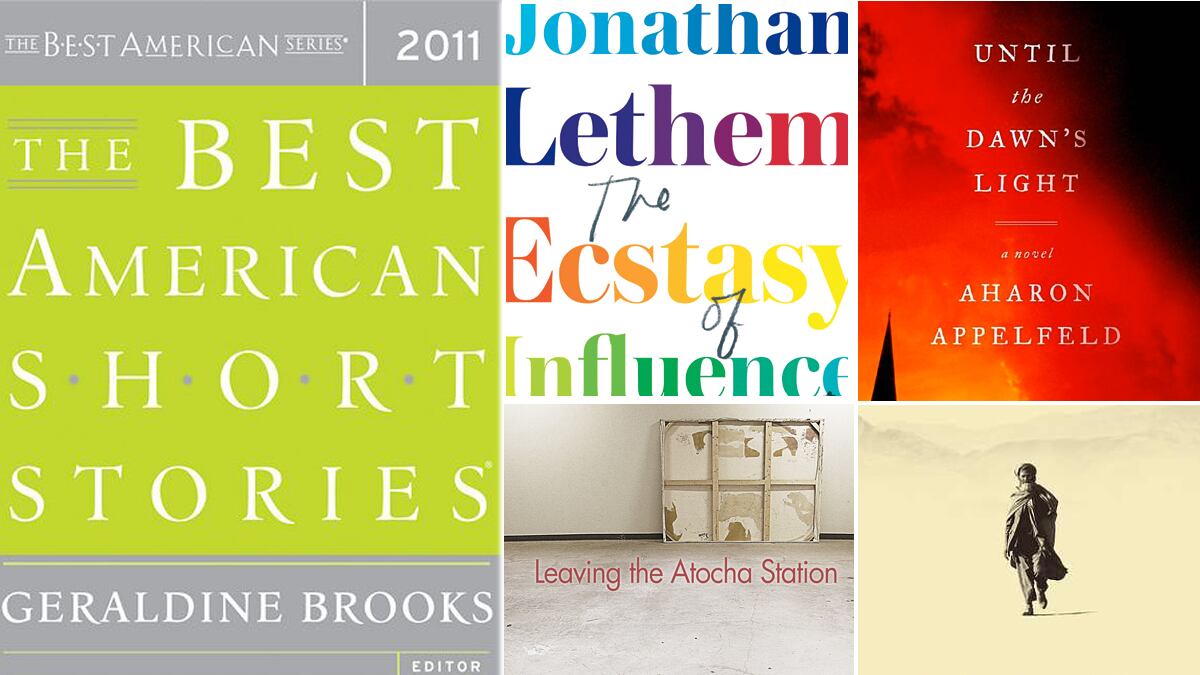Best American Short Stories 2011 What defines the American short story? The annual anthology presents its answer based on novelist Geraldine Brooks’s picks.

This year’s Best American Short Stories anthology begins with a gentle complaint by the series editor, Heidi Pitlor, about the homogeneity of the American short story—domestic and realist with a slightly quirky authorial voice, it might, say, feature a disaffected adolescent who finds solace from his parents’ divorce in his nonconformist flute teacher. “Welcome to American short fiction,” she imagines saying to the issue’s editor, the Australian-born novelist Geraldine Brooks. “Please don’t judge us.” Still Brooks found a diverse selection of stories, from George Saunders’s sci-fi tale of convicts serving as guinea pigs for psychoactive drugs to Tom Bissell’s very funny story of a marriage-scuttling Roman honeymoon. The anthology features stories by Jennifer Egan, Chimamanda Ngozi Adichie, Mark Slouka, among others.
The Wandering Falcon From a Pakistan civil servant, a fictional glimpse into the closed-off world of his country’s tribal regions.

The spare interlocking stories of The Wandering Falcon depict life in the tribal regions of Pakistan and the traditions that guide it. A child is born in the beginning of the book and drifts through its chapters—appearing as an orphan, an informer, a guide—but he’s rarely central to them. Rather than the boy’s development, Ahmad focuses on the world he lives in, the codes that rule it, and the dramatic crises those rules can lead to. Ahmad wrote these stories 30 years ago, while he was working in the region as a civil servant. He brings to his stories both familiarity with the region and an outsider’s appreciation for detail.
The Ecstasy of Influence Acclaimed novelist Jonathan Lethem presents a collection of his greatest nonfiction hits on everything from Norman Mailer to Bob Dylan to plagiarism.

Jonathan Lethem's exuberant whiz-bang of an essay collection opens with a failed introduction, a self-conscious admission that the whole idea of an authentic authorial self is a fiction. It explodes, and here are the innards: homages to Norman Mailer, Philip K. Dick, J. G. Ballard, John Cassavetes, Marvel comics; personal tales of book tours and a travels; an ode to James Brown and an interview with Bob Dylan; a praise of plagiarism—the famous title essay—composed entirely of plagiarized and paraphrased snippets of others' writing. The influence of one author on another isn't something to be overcome but to be celebrated. “Let a thousand canons Bloom,” he writes in a follow-up to Ecstasy.
Until the Dawn’s Light A haunting portrayal of a mixed marriage in 1912 Austria and the wife’s struggle to understand it, by Israeli master Aharon Appelfeld.

The latest novel from Israeli novelist Aharon Appelfeld, Until Dawn’s Light takes place in 1912 Austria and tells the tale of Blanca, a bright, ambivalently Jewish woman who gave up her plans of college to marry her brutal, ominously named classmate Adolf Hammer. Appelfeld deftly moves between the present, when Blanca has fled Adolf and is hiding with her son, writing a memoir for him, and the past she is recounting. It’s a bleak past: trapped by the increasingly abusive Adolf, she’s forced to abandon her ailing parents and eventually turn to crime in an attempt to save her son. Appelfeld renders his characters and their quandaries with fablelike clarity and economy.
Leaving the Atocha Station A widely acclaimed debut novel with a slyly self-conscious look at a young poet just passing the time.

Ben Lerner’s debut novel is a portrait of a young poet far too self-conscious and postmodern to be sucked uncritically into any portrait-of-the-artist-as-a-young-man narrative. From the beginning, Adam Gordon, the narrator, an American on a poetry fellowship in Madrid, confesses that he doubts anyone has ever had a “profound experience of art” and that the closest he’s come is “a profound experience of the absence of profundity.” He spends most of his fellowship caught in similar spiraling and very funny doubts—that and smoking spliffs, reading Tolstoy, adopting ridiculous personas as he pursues two Spanish women, and evading the head of his program. Not much happens, but Lerner’s prose, at once precise and swerving, propels the book in lieu of a plot and creates an experience of something Gordon criticizes more heavily plotted books of failing to capture: “the texture of time as it passed, life’s white machine.”






